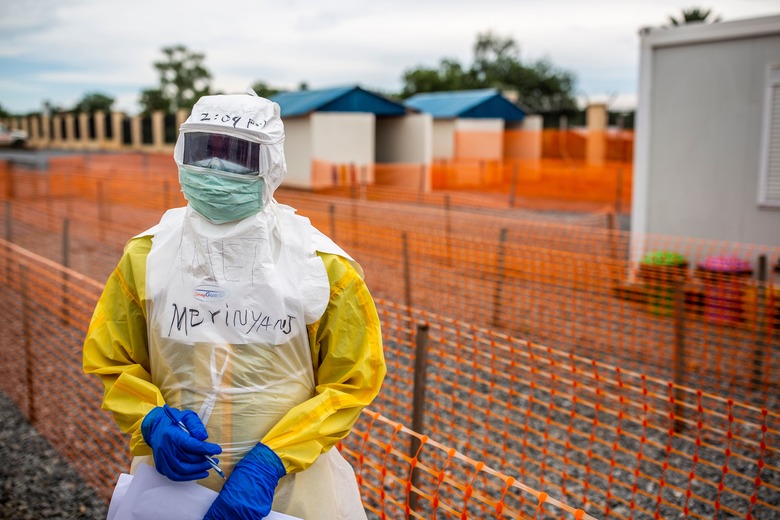Ebola Is Still A Thing: Here's The Latest
It's been six years after a massive Ebola outbreak killed more than 11,000 people in West Africa. While public health efforts have largely curbed that crisis, the disease is still a major concern for people everywhere from the Democratic Republic of Congo to Japan, even as scientists inch closer to finally providing a vaccine for the killer virus.
The World Health Organization is still calling the situation in the DRC an emergency, even though the rate of new infections is finally slowing. Since the outbreak started last August, more than 3,200 people have been infected, and more than 2,000 have died.
But public health officials on the ground in the DRC have been working hard to decrease those numbers, and their efforts are paying off. In their work to rapidly detect cases, strengthen local health system and improve community engagement has helped numbers slow to just 300 new infections in the past 3 weeks.
It's a start. But the public health officials say that's all the more reason to keep up those efforts, as opposed to believing the problem is gone, since outbreaks of the highly contagious and deadly disease can spark again at any moment if guards are let down.
Importing Ebola ... on Purpose?
Importing Ebola ... on Purpose?
Another place that's still aware of Ebola's threat? Japan. The country is gearing up to host the 2020 Summer Olympics next July, and in addition to thinking about typical Olympic preparations like constructing stadiums and making gold medals, officials have to think about the public health concerns that come anytime citizens from around the world gather in a single place.
To prepare, Japan imported Ebola in order to study it, along with four other highly infectious viruses like the Marburg virus and the Lassa virus. It's the first time that any pathogens with danger ratings as high as these have been allowed into the Japanese National Institute of Infectious Disease.
There was some local opposition to the move. But the country's medical professionals have voiced approval at the ability to learn more about the diseases in an effort to protect citizens in the unlikely event of an outbreak or bioterror attack.
End in Sight?
End in Sight?
There is some good news on the Ebola front – a European panel just backed a vaccine that can potentially protect people against the most common strain. Now, the only stop between a fully licensed drug, which will be marketed under the name Ervebo, will be approval from the European Commission. The FDA may also approve it by March of next year.
As part of the vaccine's testing process, public health officials administered close to 240,000 doses of it in the DRC to try to help with the current outbreak. Many have credited the trial with saving lives, though others from organizations like Doctors Without Borders have said that WHO could have done even more with the doses they do have as part of the drug's trial.
Regardless, public health officials are hopeful that the vaccine will receive full approval soon and begin to be widely and efficiently administered by the middle of next year.
Cite This Article
MLA
Dragani, Rachelle. "Ebola Is Still A Thing: Here's The Latest" sciencing.com, https://www.sciencing.com/ebola-news-update-13722560/. 25 October 2019.
APA
Dragani, Rachelle. (2019, October 25). Ebola Is Still A Thing: Here's The Latest. sciencing.com. Retrieved from https://www.sciencing.com/ebola-news-update-13722560/
Chicago
Dragani, Rachelle. Ebola Is Still A Thing: Here's The Latest last modified March 24, 2022. https://www.sciencing.com/ebola-news-update-13722560/
